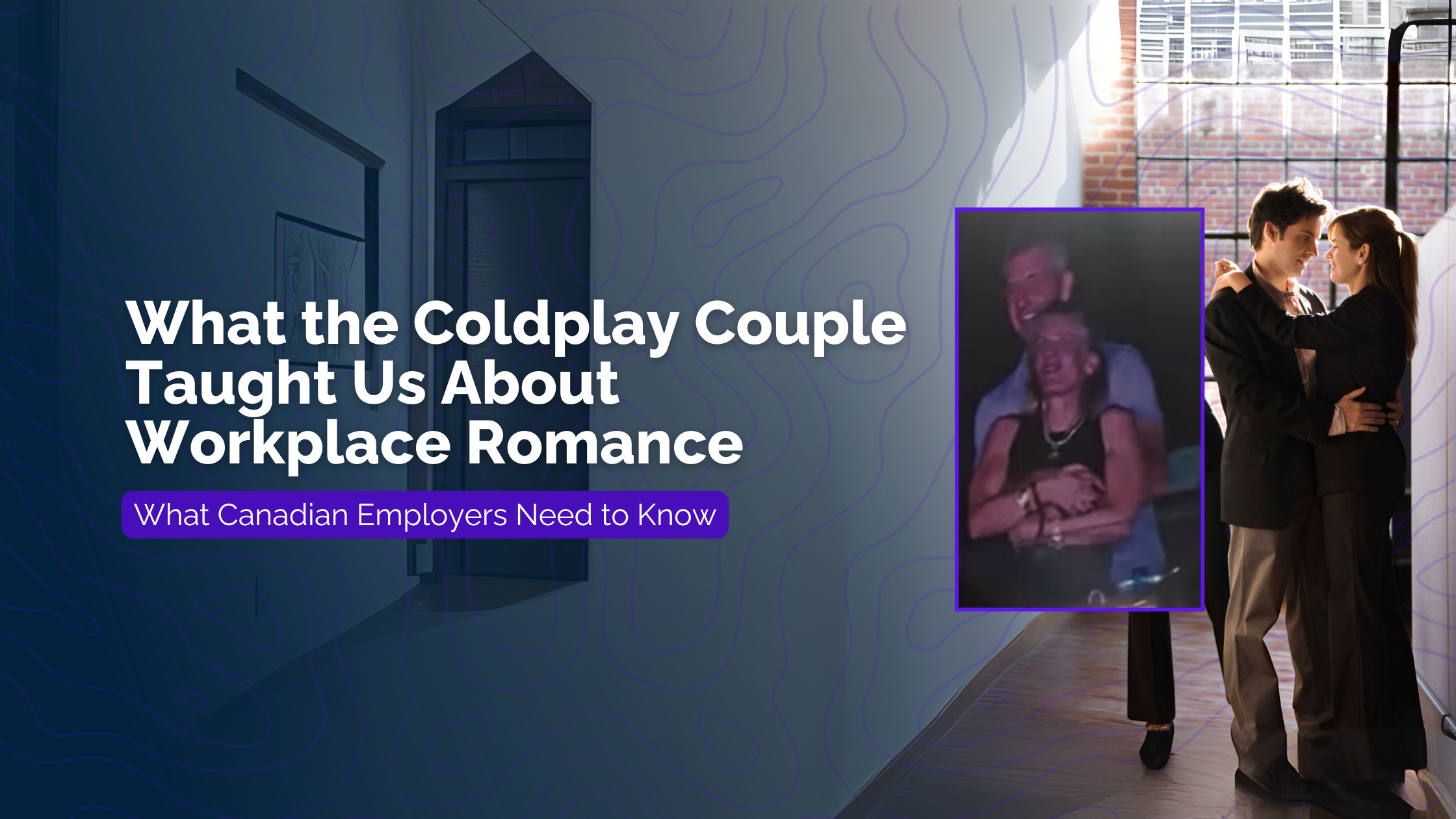It was supposed to be a feel-good moment—two people caught on the jumbotron during a Coldplay concert, sharing a hug under the spotlight. But as internet sleuths quickly uncovered the identities of the couple, the feel-good moment turned into a full-blown conversation about workplace romance, power dynamics, workplace boundaries, and corporate accountability.
And while the incident happened in the U.S., it hit a nerve for Canadian employers, too. It’s a reminder that what happens outside the workplace doesn’t always stay outside—and when workplace romance involves an imbalance of power, the legal and reputational risks are real.
Let’s unpack what Canadian employers need to know.
P.S. If you don’t know what we’re referring to, a google search of “Coldplay jumbotron couple” will definitely help to provide you with some background on this.
There’s No Law Against Love—But There Are Laws Against Harassment
In Canada, there are no specific laws that prohibit romantic relationships in the workplace. But that doesn’t mean employers are off the hook. Under provincial occupational health and safety laws (like Ontario’s Occupational Health and Safety Act), employers have a legal duty to maintain a harassment-free workplace—even when no formal complaint is made.
A recent Ontario Court of Appeal decision reaffirmed this: even if no one comes forward with a complaint, the employer still has an obligation to investigate if there’s reason to believe that workplace harassment may have occurred. And yes, that includes situations where a romantic relationship—especially one involving a power imbalance—might later be viewed as coercive.
Why Power Dynamics Matter More Than Ever
The Coldplay couple’s situation mirrors what Canadian courts have long cautioned against: relationships involving a clear difference in authority. The landmark Simpson v. Consumers’ Association of Canada case from 2001 established that even if a relationship appears consensual, courts will scrutinize whether true consent was possible, especially if one party had power over the other.
That means CEOs, managers, or anyone in a supervisory role have added responsibility. They don’t just owe a duty to their employer to behave appropriately—they also owe a duty to protect the company from legal fallout.
Why a Workplace Romance Policy Is No Longer Optional
Employers should consider implementing a clear workplace romance/relationships policy—especially to address situations involving leadership and subordinates. A good policy:
- Does not permit relationships with power imbalances, specifically for direct supervisors
- Outlines disclosure requirements (e.g., notifying HR)
- Clarifies consequences for non-compliance
- Reinforces the right to report inappropriate behaviour without fear of retaliation
Keep in mind that the policy should be part of your broader harassment prevention program and be backed by training and communication, not just legalese buried in a handbook.
Train and Educate—Before a Hug Goes Viral
While Coldplay’s “Kiss Cam” may have seemed harmless, the aftermath shows how reputational damage can quickly spread. Employers should educate staff about workplace relationships, including:
- How to identify and report harassment
- The risks of romantic entanglements in the office
- What constitutes a conflict of interest
Remember: prevention is always easier (and cheaper) than damage control.
When Romance Becomes a Risk: What Employers Can Do
If a workplace relationship raises concerns—especially one involving a supervisor and subordinate—employers should be ready to:
- Conduct a prompt and impartial conflict-of-interest assessment
- Reassign roles or reporting structures if necessary
- Monitor for signs of favouritism or discomfort among other staff
And yes, if the relationship ends poorly or impacts the workplace, employers may need to investigate and take corrective action, including discipline or even termination—not because of the relationship—but because of its impact.
But terminating someone because they were in a relationship carries risk, particularly if there’s a hint of discrimination, retaliation, or gender bias. Always consult legal counsel before making any major decisions.
Bottom Line: Keep the Romance, Ditch the Risk
The Coldplay concert moment may have caught us all off guard—but for employers, it’s a lesson in preparedness. Workplace romances aren’t inherently wrong—but if mishandled, they can trigger serious legal, cultural, and reputational consequences.
If you don’t already have policies in place, now’s the time to act. Because when love and liability mix, your best defence is a clear policy, thoughtful leadership, and proactive communication.
Also read: Office parties: Employer Obligations & Employee Safety
Need help with your complex HR challenges? Talk to one of our HR experts today!

